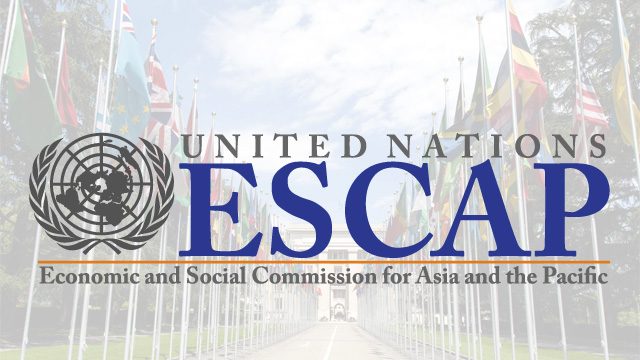SUMMARY
This is AI generated summarization, which may have errors. For context, always refer to the full article.

MANILA, Philippines – The Philippine economy is forecast to expand by 6.7% this year, with growth to be driven by private consumption and investment, the United Nations Economic and Social Commission for Asia and the Pacific’s (UN ESCAP) said Wednesday, August 6.
The UN ESCAP forecast is at the lower end of the government’s 2014 target of 6.5% to 7.5%.
“The Philippines, in contrast to other major economies experiencing moderate growth, is forecast to experience a high growth rate of 6.7% in 2014. This is, however, lower than the strong growth performance of 7.2% in 2013 despite the destruction wrought by Typhoon Haiyan in November that year,” the UN ESCAP said in its latest report.
The UN ESCAP report, “Economic and Social Survey of Asia and the Pacific 2014,” also cited the Philippines as an example of growth driven by a conducive policy climate. It mentioned the government’s significant productive public spending in infrastructure and social areas, and increased private investment.
The UN ESCAP also said that the Philippine government may need to consider relaxing its fiscal deficit gap of 2% of Gross Domestic Product (GDP) to finance the reconstruction of Typhoon Haiyan-hit areas and to close infrastructure gaps in general.
The UN ESCAP analysis also suggests that tax revenues could be raised by about 11%.
“Among others, policies to enhance domestic resource mobilization include rationalizing the tax system to create a larger tax base, tackling tax evasion and tax fraud, and strengthening tax administration,” the UN ESCAP said.
June spending to ‘support’ Q2 growth
Meanwhile, National Economic and Development Authority (NEDA) Director General Arsenio Balisacan said on Wednesday, August 6, that the increased spending in June can help support economic growth in the second quarter of the year.
“The manufacturing and services sectors are doing quite well. As for the agriculture sector, some crops were destroyed, so Typhoon Glenda could have dampened a bit of the growth,” Balisacan said at the sidelines of the Development Budget Coordination Committee briefing on the proposed 2015 budget.
The NEDA chief added that he hopes the truck ban in Manila and the resulting cargo congestion at the Manila port would have only marginal effect on the economy, even as he suggested that these had contributed to higher prices of goods.
“[It would be best] if we would be able to solve this the soonest. I think the port problems would have contributed to the escalation of prices,” Balisacan said.
Finance Secretary Cesar Purisima, who was also at the budget briefing, said that the truck ban is not the only issue that needs to be addressed, but also the lack of capacity of Manila ports to handle all containers.
“We encourage users to use the Batangas and Subic ports. So far there has been a big improvement in the utilization of both ports,” Purisima said. – Rappler.com
Add a comment
How does this make you feel?



![[Ilonggo Notes] The foremost Filipino engraver, sadly unremembered, needs to be given his due](https://www.rappler.com/tachyon/2024/03/Figueroa-.jpg?resize=257%2C257&crop=265px%2C0px%2C720px%2C720px)

There are no comments yet. Add your comment to start the conversation.